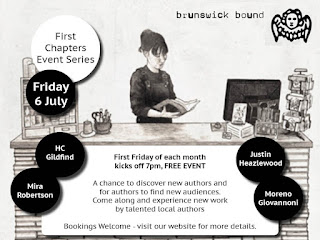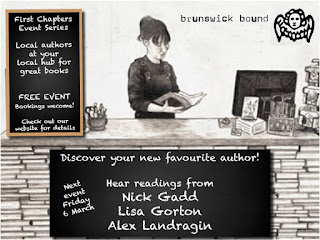First Chapters Q&A with Paul Filev
Paul Filev is a Melbourne based literary translator and editor. Paul translates from Macedonian and from Spanish. Some of his translated work appears in 2018 Best European Fiction and he will be reading from his most recent translation (from Macedonian) Alma Mahler by Sasha Dimovski.
1.
Brunswick Bound has asked you to read a chapter from a published work for First Chapters.
Tell us what we can expect from the chapter you have chosen?
After providing a brief context for the novel, I will
read the first few paragraphs from the opening chapter in the original
Macedonian to give people a sense of the language, and then read the
translation, including a bit more of the chapter, which acts as the “overture”
or “prelude”, introducing the main themes and preoccupations of the novel.
2.
What kind of books do you write translate?
Literary fiction predominantly from Macedonian, but also
from Spanish.
Aside from reading Macedonian and Spanish literature in
the original language, I read mainly translated fiction from a variety of
languages. I’m drawn to hybrid narratives; non-linear narratives; psychological
novels; essayistic novels; meandering, plotless texts; self-inquisitorial
discourse; miscellany; writers who defy easy categorisation; writers who push
boundaries blending/transgressing genres and forms (Man Booker International
winner, Olga Tokarczuk) + (eg. Clarice Lispector, Enrique Vila-Matas, Rosa
Montero, Mario Vargas Llosa, Robert Walser, W. G. Sebald, László Krasznahorkai,
Jung Young Moon, Daša Drndić, Dubravka Ugrešić) + (untranslated Macedonian
writers Venko Andonovski, Olivera Korveziroska, Branko Prlja, Dimitrie Duracovski).
3.
What was the first book that you read (or had read to you) that left an
impression on you?
My devotion to literature began once I had emerged from
the swamp of childhood and entered my own adolescent Sturm und Drang (storm and
stress), starting with Alain-Fournier’s only novel Le Grand Meaulnes
(1912). Drawing on the themes of verse romance from the Middle Ages (the
adventures of a heroic knight errant on a quest), Alain-Fournier’s elegiac
novel, subtitled The Lost Domain, uses a dream-like atmosphere to
explore adolescent initiation and regret for lost love and vanished youth.
François Seurel narrates the story of his friendship with Augustin Meaulnes who
embodies the requisite Sturm und Drang qualities: he is reckless, impulsive,
and adventurous, with a great capacity for love and torment. One day, Meaulnes
travels outside the village where he lives with François and ends up getting
lost. While wandering, lost in the countryside, he comes across a party being
held on a mysterious estate (domain). There he meets a beautiful girl—his
idealised love. Pledging devotion, he asks her permission to return to the
domain to see her. She accepts his request and promises to wait faithfully for
his return. Meaulnes returns to the village and tells François about his
adventure but his quest to recover the lost domain and his lost love are
frustrated by his inability to find his way back to the estate. (At last count,
translated 6 times! With 6 different titles: The Wanderer; Le GrandMeaulnes (The Lost Domain) tr. by Frank Davis; Meaulnes: The Lost Domain;
The Wanderer or the End of Youth; Le Grand Meaulnes: The Land of the
Lost Contentment; The Lost Estate (Le Grand Meaulnes). But as a
translator, strangely I haven’t read any of the other translations; in fact, I’ve
avoided rereading it! – in the same way that Meaulnes was frustrated by his
ability to find his way back to the estate, I’m worried about not “finding my
way back” to the original experience of the novel.
4.
What question do you hope never to be asked in an author Q&A?
Is Macedonian the same as Greek?
5.
What question do you hope you will be asked and why?
Why do you translate?
Mainly for the pleasure of sharing stories with others –
making available stories written in another language to English-speaking
readers; but in particular, because translation offers an intense reading
experience and a more nuanced understanding of a text and the language; and
also because translation is a creative response to a text – I’m almost never
satisfied with just finishing a book; I always have a need to respond to the
text in some way: notes/comments in the margins; blogging about it; (and in the
past) even putting up graffiti about what/who I’ve read! Translation seems like
the ultimate response.
AND/OR
Can you provide an example of the challenges faced by
translators?
 The role of choice in literary translation cannot be
overemphasised. Literary translation involves endless choices: of words, sentence
structure, level of formality, punctuation, and even spelling. “Anxiety-laden”
choices that can “haunt” the translator long after the final published version;
this highlights the “unfinished” nature of translations—as opposed to novels
written in the original language—and the possibility for numerous translations
of a particular work, eg. Metamorphosis by Kafka (11 English translations at
last count), and Death in Venice by Thomas Mann (5 at last count).
The role of choice in literary translation cannot be
overemphasised. Literary translation involves endless choices: of words, sentence
structure, level of formality, punctuation, and even spelling. “Anxiety-laden”
choices that can “haunt” the translator long after the final published version;
this highlights the “unfinished” nature of translations—as opposed to novels
written in the original language—and the possibility for numerous translations
of a particular work, eg. Metamorphosis by Kafka (11 English translations at
last count), and Death in Venice by Thomas Mann (5 at last count).
To give you an idea of the problem of choice from the
text I just read:
“I would have time to climb aboard a different train, toss
my suitcases onto another platform. Toss them, and even thoroughly wreck
them.”
Да ги лупнам и да ги искршам.
Slam/Bang sth. down
and break/crush/smash sth. to pieces.
6.
Do you believe that books should answer life’s big questions?
Not sure about “answering” them, but definitely “posing”
and “exploring” them; getting readers to ask questions; leaving ideas open for
readers to consider.
What I do believe, as Croatian writer Daša Drndić has said,
is that: “It’s indecent for literature to be pretty; it should offend, hurt,
insult, provoke.”
(Works that resist the idea that art must be morally
correct and inoffensive; value artistic originality and vision, eg. Lolita
by Nabakov – *not a translation: controversial subject: the protagonist and
unreliable narrator, a middle-aged literature professor is obsessed with a
12-year-old girl, Dolores Haze, with whom he becomes sexually involved after he
becomes her stepfather; the word play and wry observations of American culture;
tragicomic tour de force crosses the boundaries of good taste).




Comments
Post a Comment